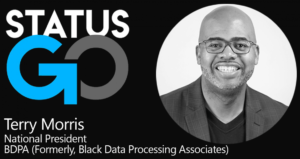 Status Go – Episode 95
Status Go – Episode 95
There is a wonderful analogy from Jonathan Haidt, a psychologist at NYU, used to describe the two sides to our brain, the logical and the emotional. Haidt compares our brain to an elephant and a rider. The rider represents the logical side of our brain and the elephant the emotional. To affect change, you have to appeal to both the elephant and the rider, both must want to go down the path. In this episode, we speak to the rider, the logical side. My guest is Vinay Bhagat, Founder, and CEO of TrustRadius, one of the most trusted review sites for business technology, serving both buyers and vendors. Trust Radius recently released the results of a comprehensive survey of race in tech. Their 2020 People of Color in Tech Report is a wealth of data…just what the rider needs!
Vinay and I dig into some of the survey results that jumped out at me when I read the report: the disconnect between unconscious bias in hiring and promotion and the perception of the white respondents; the feeling that half the people of color have when it comes to reporting discrimination in the workplace; the effectiveness of Diversity, Equality & Inclusion initiatives; and, the encouraging news there is an improvement in some of the numbers.
Listen in as we discuss these results and more! You can read the full report here: 2020 People of Color in Tech Report.
Status Go is the weekly podcast from InterVision. We provide actionable insights from technology leaders to technology leaders who want to break out of the status quo and lead their businesses into the new future. Listen to more of our episodes here: https://www.intervision.com/statusgo-podcasts/



 Last week’s Leadership Thought “
Last week’s Leadership Thought “

